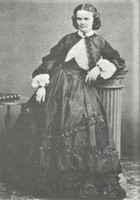"Miss Harriet Hosmer," Liberator, Nov 20, 1857
Dublin Core
Title
Subject
Description
Credit
Creator
Publisher
Date
Type
Article Item Type Metadata
Text
The interest I take in works of art, and the still greater interest I feel in the free and full development of woman's faculties, have always drawn me powerfully toward Harriet Hosmer, and the productions of her chisel
The energy, vivaciousness and directness of this young lady's character attracted attention even in childhood. Society, as it is called, – that is, the mass of humans, who are never alive in real earnest, but congratulate themselves, and each other, upon being mere stereotyped formulas of gentility or propriety, – looked doubtingly upon her, and said, 'she is so peculiar!' 'She is so eccentric!' Occassionally, I heard such remarks; and being thankful to God whenever a woman dares to be individual, I also observed her. I was curious to ascertain what was the nature of the pecularities that made women suspect Achilles was among them, betraying his disguise by unskilful use of his skirts; and I soon became convinced that the imputed eccentricity was merely the natural expression of a soul very much alive and earnest in its work.
'She could not hide
The quickening inner life from those at watch.
They saw a light at the window, now and then,
They had not set there. Who had set it there?
* * * They could not say
She had no business with a sort of soul,
But plainly they objected and demurred.'
This aroused in me a most earnest hope that the fire in her young soul might not expend itself in fitful flashed, but move its divinity by burning brightly and steadily. Here was a woman who, at the very outset of her life, refused to have her feet examped by the little Chinese shoes, which society places on us all, and then misnames our feeble tottering feminine grace. If she walked forward with vigorous freedom, and kept her balance in slippery places, she would do much toward putting those crippling little shoes out of fashion. Therefore, I fervently bade her God-speed. But, feeling that the cause of womankind had so much at stake in her progress, I confess that I observed her anxiously.
The art she had chosen peculiarly required masculine strength of mind muscle. Was such strength in her? I saw that she began wisely. She did not try her 'prentice hand on pretty cameos for breast pins, or upon ivory heads for parasoly and canes. Evidently, sculpture was with her a passion of the soul, an earnest study, not a mere accomplishment, destined to be the transient wonder of drawing rooms. She made herself thoroughly acquainted with anatomy not merely by the aid of books, and the instructions of her father, but by her own presence in the dissection rooms. She took solid blocks of marble to her little studio in the garden, and alone there in the early morning hours, her strong young arms chiselled out those forms of beauty which her clairvoyant soul saw hidden in the shapeless mass.
She tried her hand on a bust of the first Napoleon, intended as a present for her father. This proved that she could work well in marble, and copy likenesses correctly. Her next production [...]. They proved an uncommon degree of talent; of that there could be no doubt. But did they establish Miss Hosmer's claim to genius? In my own mind, this query remained unanswered. I rejoiced that a woman had achieved so much in the most manly of the arts. I said to myself -
'It was in you – yes,
I felt 'twas in you. Yet I doubted half
If that of-force of German Reichenbach,
Which still from female finger-tips burns blue,
Could strike out like the masculine white-heats.
To quicken men.'
When I heard that she was modelling a statue of Beatrice Cenci [...], I felt that the subject was admirably chosen, but difficult to execute. I hastened to look at the statue, as soon as it arrived in Boston. The query in my soul was answered. At the first glance, I felt the presence of genius; [...].
Critics may prove their superiority of culture by finding defects in this admirable work, or imagining that they find them: but I think genuine lovers of the beautiful will henceforth never doubt that Miss Hosmer has a genius for sculpture. I rejoice that such a gem has been added to the arts. Especially do I rejoice that such a poetical conception of the subject came from a woman's soul, and that such finished workmanship was done by a woman's hand.
'Man doubts whether we can do the thing
With decent grace, we've not yet done at all.
Now do it! Bring your statue! You have room,
He'll see it een by the starlight here.
* * * * There is no need to speak.
The universe shall henceforth speak for you,
And witness, She who did this thing was born
To do it - claims her license in her work.'
L. MARIA CHILD.


